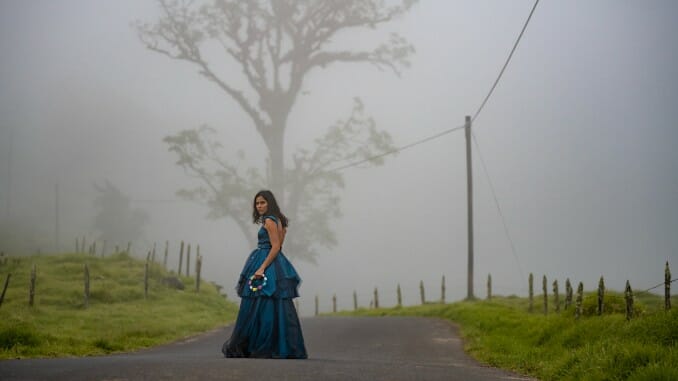Psychosexual Drama Clara Sola Disrupts the Feminine Mystique Through Magical Realism

When watching Clara Sola, the feature debut of Costa Rican-Swedish director Nathalie Álvarez Mesén, it’s easy to focus on surface-level comparisons to Carrie. After all, the plot revolves around a sexually stunted woman who possesses psychic abilities and lives under the domineering rule of her religious mother. However, where Carrie descends into a horrifying tale of feminine tribulation and tragedy, Clara Sola utilizes a quaint natural realism to unravel the limitations of ascribing to the feminine mystique. The film confronts the patriarchal roles cast on women from generation to generation—even when men aren’t necessarily present to pass them down. As it turns out, women will happily bestow these oppressive ideals onto their daughters in order to reinforce a societal status quo tainted by sexist notions of what constitutes a “good” woman.
In a bucolic Costa Rican village, 40-year-old Clara (Wendy Chinchilla Araya) spends her days caring for her majestic white horse Yuca and crafting makeshift lodgings for forest insects. Due to her childlike disposition and a congenital spinal curvature, Clara’s principal duty lies in being the town mystic. Her mother Fresia (Flor María Vargas Chavez) charges locals a small fee for the promise of Clara’s supposed healing powers. According to Fresia, her daughter was visited by the Virgin Mary in her youth, and has since possessed the ability to cure cancer, heal knees and mend hearts. Despite constantly touting (and materially benefiting from) Clara’s holy powers, it’s clear that Fresia is still reeling from the death of her other daughter Angela, whose own daughter María (Ana Julia Porras Espinoza) is about to celebrate her quinceañera. The young, beautiful María is doted on by her grandmother in the wake of her momentous coming-of-age celebration; meanwhile, Clara is denied a cost-free surgery that would correct her spinal issues.
“God gave her to me like this,” Fresia declares. “She stays like this.” Annoyed, María retorts, “Then I should’ve left my teeth crooked?” Barely missing a beat, Fresia merely asserts, “You’re different.”
In reality, Clara is the one who’s perceptibly “different.” Never granted adult agency by her mother or her broader community, it becomes a veritable crisis when she begins to experience intense sexual desire after a spirit-shifting tremor rumbles under the earth. In an effort to deter masturbation, Fresia rubs chili peppers on Clara’s fingers before she watches her nightly telenovela episode. Undeterred, Clara rouses in the dead of night to crouch over a running hose in an attempt to alleviate the burning. The issue intensifies when she begins to develop a crush on María’s much-older boyfriend Santiago (Daniel Castañeda Rincón), who in turn forms an intimate friendship with Clara that borders on the erotic. A psychosexual love triangle ensues, oddly tender in its cautious clumsiness.
-

-

-

-

-

-

-

-

-

-

-

-

-

-

-

-

-

-

-

-

-

-

-

-

-

-

-

-

-

-

-

-

-

-

-

-

-

-

-

-








































